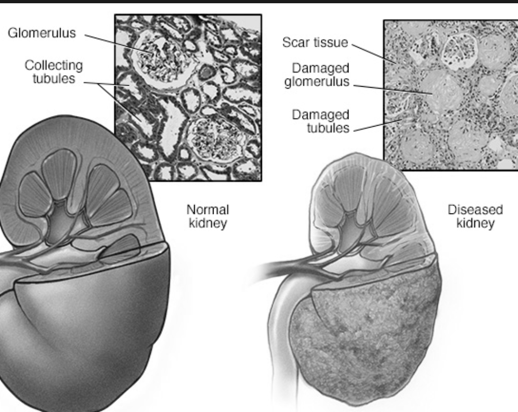When your kidneys can no longer do their job, hemodialysis can do the job for them. The blood is filtered a little at a time, removing wastes, extra salt and excess fluid. This helps keep blood pressure under control, and regulates the content of the blood.
You can help your treatment work for you, through careful attention to your diet.
The diet needed for a dialysis patient is unique. A renal (kidney) dietitian at the dialysis center can help you with this.
Too much of the mineral potassium affects heart rate. To keep the proper amount of potassium in your blood, limit or avoid avocados, bananas, kiwis, melons, nectarines, oranges, potatoes, prunes, tomatoes or dried fruit, pumpkin, winter squash, asparagus, beets, spinach, parsnips and rutabagas.
Too much phosphorus weakens bones by leaching out calcium, and makes your skin itch. Avoid bran cereals, brown rice, dried beans, chocolate, colas, lentils, nuts, milk and cheese, organ meats, salmon and sardines, peas and peanut butter.
Acceptable dairy foods low in phosphorus are butter, cream cheese, heavy cream, ricotta and brie.
Sodium should be monitored carefully. This applies also to sodium in processed foods. High blood pressure and congestive heart failure can result from too much salt, because it increases your thirst.
Drinking more liquids can cause weight gain and swelling, and overwork your heart to move the extra fluids through your body. Avoid salt substitutes as they contain potassium. Use spices instead of salt.
Hemodialysis will remove wastes from your blood, but wastes can build up between sessions. Being careful about what you eat and drink can cut down the amount of wastes in your blood and prevent it from making you ill.
It's vitally important that you eat as much high-quality protein as possible, like eggs, fish, red meat and poultry. These higher quality sources will produce less urea (a waste product) and keep your muscles and tissues in good repair. You will be less susceptible to infection and will recover faster from any surgery.
If you need to gain weight, healthy fats and oils will help you do this.
Your doctor can prescribe a vitamin and mineral supplement specifically for kidney failure. This will help address any lack of nutrients from eating a restricted diet, and from vitamin loss due to the dialysis.
The move to hemodialysis is a life-changer. The right dietary changes can make the transition an easier one.
Resources:
Nutrition and Hemodialysis
http://www.kidney.org/atoz/content/nutrihemo.cfm
Diet suggestions for dialysis patients
http://www.essortment.com/all/dialysisdiet_rkcs.htm
Treatment Methods for Kidney Failure: Hemodialysis
http://kidney.niddk.nih.gov/kudiseases/pubs/hemodialysis
Diet - chronic kidney disease
http://www.nlm.nih.gov/medlineplus/ency/article/002442.htm
Dietary Guidelines for Adults Starting on Hemodialysis
http://www.kidney.org/atoz/content/dietary_hemodialysis.cfm
Eat Right to Feel Right on Hemodialysis
http://kidney.niddk.nih.gov/Kudiseases/pubs/eatright/index.htm
Visit Jody's website and blog at http://www.ncubator.ca and http://ncubator.ca/blogger






Add a CommentComments
There are no comments yet. Be the first one and get the conversation started!